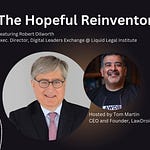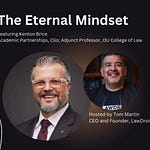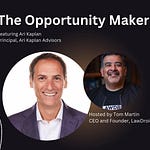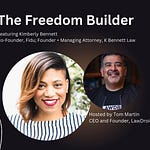The world feels off its axis. Authoritarian impulses, once relegated to distant corners of history, now threaten the institutions we cherish. Democracy falters in places we long considered impregnable, international alliances shatter under the weight of protectionism, and a climate of fear turns neighbor against neighbor. Even the most steadfast champions of liberty seem caught off guard. In this urgent hour, can we summon the courage to stand up before everything we claim to hold dear slips away?
Such was the tenor of a recent “Unfiltered Conversation” between Law21 legal analyst Jordan Furlong and LawDroid CEO Tom Martin: two voices united by conviction that speaking out now is not only permissible but a moral imperative. Their dialogue, frank and unguarded, comes at a time when so many of us harbor grave worries we only dare whisper behind closed doors. It is, in short, the conversation a free people desperately need to have in public.
Unfiltered, Because the Stakes Are Too High
Martin began by explaining why these conversations must be “unfiltered.” Lawyers are trained to weigh risks, parse language, and speak cautiously. But with the political ground shifting in alarming ways: tariffs wielded like weapons, constitutional protections undermined, and entire swaths of society cast as “enemies”, now is not the time for polite half-measures.
“Given the urgency,” Furlong declared, “it’s incumbent upon us to say there are bad things happening, and we need to do something about it.” Their shared conviction that silence enables these encroachments underpins this dialogue. As Martin put it, certain critical truths are being discussed “in private messages and closed circles,” but we need them out in the open, where we can illuminate a path for each other and galvanize action.
Allies Turned Adversaries: The U.S.-Canada Rift
What does it mean when the government of the United States, once a stalwart beacon of democratic principles, launches crippling tariffs against decades-old allies, including Canada, in ways that seem designed to provoke rather than negotiate?
For Martin, who was born and raised in Los Angeles but became a naturalized Canadian citizen, seeing the two nations at odds is nothing short of heartbreaking. There is a monument at the Peace Arch border crossing in Vancouver that describes Americans and Canadians as “brethren,” bonded by a shared tradition. Now, references to “51st state” status and “Governor Trudeau” cut deeply into Canadian notions of sovereignty. As Furlong notes, this economic hostility also carries a symbolic weight, a betrayal of trust that will not easily be repaired.
The question is not just about trade deficits or tariff policies. The broader worry is “the forgetting of why” we built cooperative, interlocking alliances after the devastation of two world wars. Mutual dependence was the antidote to conflict. Yet we have forgotten those lessons, succumbing to a zero-sum logic that sets every nation against each other.
Intellectual Attack: Higher Education Under Siege
From tariff wars to assaults on universities may seem a leap, but Furlong underscores a stark continuity: autocratic governments inevitably target centers of learning. Institutions like Columbia University, hoping at first to appease, found themselves making untenable concessions. Other campuses soon realized this was no mere push for “balanced viewpoints,” it was an attempt to extinguish intellectual independence altogether.
Again, we see “the forgetting of why.” Universities exist to cultivate free debate, rigorous inquiry, and critical thought, bulwarks against tyranny. Yet if the state can dictate what, and how, they may teach, we lose the very engines that generate new ideas and preserve civic values.
Law Firms Capitulating: The Slippery Slope to Chaos
Even more alarming than the crackdowns on universities is the surrender of several major American law firms to pressures from the Trump administration, reportedly signing deals that dilute their independence in exchange for continued access to lucrative government work. It is an unprecedented development. Historically, law firms have served as guardians of justice, sworn to uphold not any particular figure but the rule of law itself.
Yet Furlong admits a wrenching complexity: These firms employ thousands of people; their partners and associates have families to feed. They may feel cornered, if not outright threatened. But he reminds us that lawyers take an oath to defend constitutional principles. The oath has meaning only if, when push comes to shove, lawyers, and the firms that employ them, choose honor over profit.
Martin invokes the old Shakespeare line, “First thing you do is kill all the lawyers,” reminding us that the phrase is not simply an anti-lawyer joke. It is the cold rationale of any would-be tyrant: neutralize the legal profession, and there is no one left to enforce the rule of law. Once law firms cave to political intimidation, who will stand up to the state when rights are trampled?
Abrego Garcia Case: When the Courts Are Mocked
Consider the story of Kilmar Abrego Garcia: a husband and father, summarily detained and sent to El Salvador without any due process, in what the Trump administration called "an administrative error.” Abrego Garcia is a citizen of El Salvador, allowed to live and work legally in the United States. Lower courts have insisted Garcia be returned, even the Supreme Court ruled unanimously to “facilitate” that outcome, and still, the administration refuses to comply. What does it mean when the executive branch ignores the highest court in the land?
It means democracy is on life support. Our system rests upon checks and balances, with the judiciary guarding our constitutional rights. If the executive no longer recognizes these limits, if court orders become “optional,” then we are watching the unraveling of the very architecture of freedom.
Freedom Dies When We Forget Why
Again and again, Martin and Furlong return to this refrain: “the forgetting of why.” Why did we build alliances? To prevent another catastrophic war. Why do we protect academic freedom? Because without new ideas and fearless debate, tyranny flourishes. Why does the legal profession exist? To ensure that, rich or poor, powerful or vulnerable, we all stand equal before the law.
These things are easily taken for granted—until they are gone. Neither the U.S. Constitution nor Canada’s Charter of Rights can magically defend themselves. They require constant renewal by citizens aware of what is at stake.
Democracy dies in silence.
An Historic Call to Action
We are living through a moment that calls us, individually and collectively, to take up the mantle of past generations who fought for democracy, whether on battlefields or in courtrooms. Martin’s personal history, spanning a father, uncle and great grandfather who fought in Korea, World War II, and World War I, resonates here. People in those eras understood the cost of neglecting tyranny until it was too late.
Furlong emphasizes that no institution, no matter how storied, can rescue us if we the people stand idly by. “Nobody gets to go through life without having one of these challenges placed to them,” he reminds us, pointing to Ukraine as a modern-day example of a people’s fierce resolve in the face of existential threat. “This is our time.”
Because Tomorrow Is Not Promised
It is tempting to assume “the system will hold,” that “someone else will fix it,” that “things like that can’t happen here.” Yet history tells us that complacency is a fragile shield. Our freedoms erode when we shrug and say nothing. Our institutions degrade when we allow intimidation to become policy. Our democracy fails when we see injustice befalling someone else, an immigration lawyer, a neighbor, or a different nation, and assume it does not concern us.
‘No, Not on My Watch!’
Still, optimism remains. True, cynicism is easy in a world that “has gone mad,” but cynicism is a surrender. Furlong and Martin see a different path, a refusal to succumb. If enough people make that simple moral stand (“No, you cannot do this”), democracy stands a chance. If enough of us reclaim the reasons behind our institutions, we can salvage the rule of law from chaos.
History shows the power of ordinary men and women who stand firm. They are not all warriors with rifles; many are citizens simply refusing to yield. Citing Abraham Lincoln’s parable, Furlong notes that calling a dog’s tail a leg does not make it one. So too, calling our fundamental liberties meaningless does not negate their value, unless we agree to let them slip away.
A Renewed Covenant
The conversation ends where all great awakenings begin: with a call to realize that we are the stewards of democracy. The Constitution is paper unless people breathe life into it. Alliances are mere treaties unless citizens on both sides of a border defend them. Free speech is abstract unless we speak up in the face of threats.
Martin conceived “Unfiltered Conversations” precisely to model this courage, showing that if you are fearful or angry about our eroding institutions, you are not alone. The rule of law can endure only through unflinching public witness. “We should feel entitled; we have a right, to talk about this,” Martin says. “That’s exactly why I wanted to have this conversation.”
In the end, that is precisely the point. If you value living in a free society, a place where you can raise your children without fear of arbitrary arrest, where you can challenge authority without losing your livelihood, where you can study and speak freely, then accept this invitation. Be the person who stands up, who says “No,” who refuses to let democracy vanish on their watch. History may yet record that this was our defining hour, the moment when ordinary citizens rose to their full stature and claimed the rights and institutions their ancestors built, so that generations to come will never forget why we fought for them in the first place.
We are at the threshold of a crucial chapter in our shared story. Let us choose courage. Let us stand for principle, publicly, unequivocally, and together.














